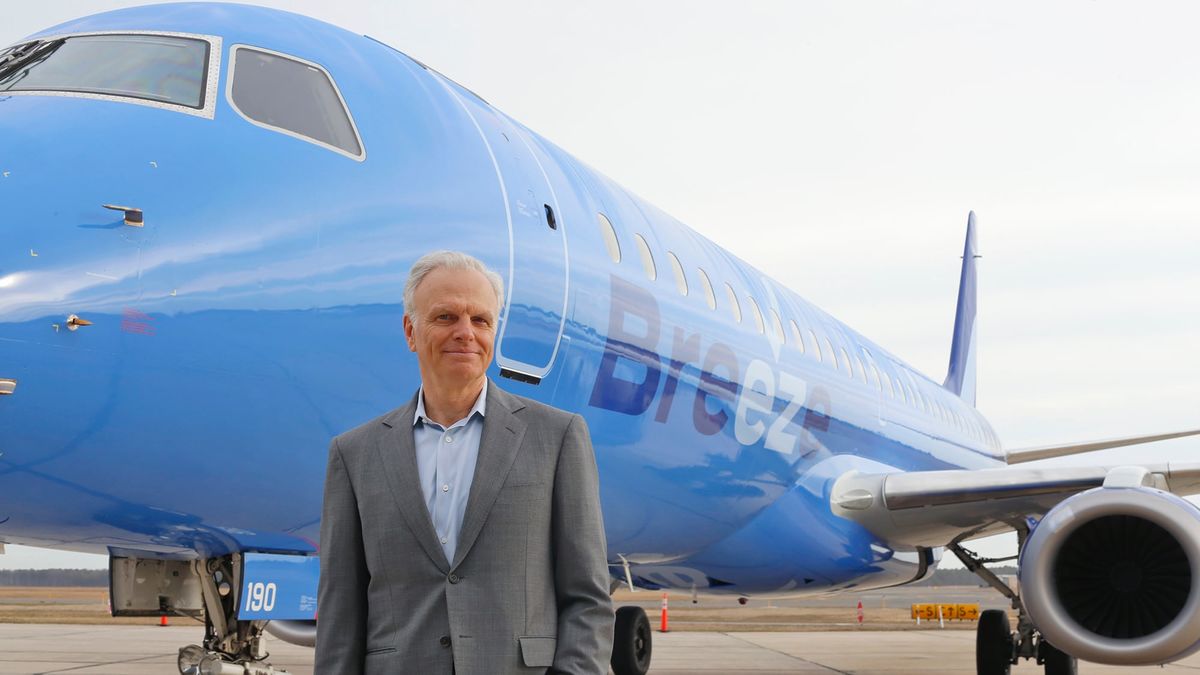JetBlue founder’s new airline Breeze takes off as travel revives
Breeze Air will launch with small all-economy Embraer jets, but Airbus A220s with business class will follow.

Airline entrepreneur David Neeleman’s newest carrier will begin flying May 27 with an initial network of 16 cities, making it the year’s second U.S. startup looking to use discount fares to grab a piece of a much-anticipated resurgence in leisure travel.
Breeze Airways started selling tickets Friday, and the first flights will connect Charleston, South Carolina; Tampa, Florida; and Hartford, Connecticut, according to a company statement.
Fares start at US$39 one way, and destinations will be added weekly through July 22 until the carrier reaches 39 routes.
Neeleman, who founded JetBlue Airways, is wagering that cheap, nonstop flights between carefully selected midsize cities will enable Breeze to carve out a market niche.
But as airlines hammered by the coronavirus pandemic battle over returning travelers, Breeze is likely to face much tougher competition than JetBlue did when it expanded in 2002 as much of the industry was still reeling from the 9/11 terrorist attacks.
“Even being wounded coming out of the pandemic, it’s totally diametrically different from a competitive standpoint,” said Dan Akins, an airline consultant at Flightpath Economics.
“Then, carriers couldn’t respond. This is not that day. I don’t think they’re going to allow him to start up and start stealing customers from point-to-point service from the menagerie of competitive airlines out there.”
Breeze Airbus A220s to feature a premium cabin
Breeze will operate 13 single-class Embraer E190 and E195 aircraft initially, and start adding larger Airbus A220 planes with a premium cabin in October. It will focus most of its flights from Tampa, Charleston, New Orleans and Norfolk, Virginia.
Americans who stayed close to home during the pandemic “have got the money, the pent-up demand,” Neeleman said during a Bloomberg TV interview. “People are anxious to get back to their normal lives, and we’re going to help them do it.”

Frontier Airlines, which went public this year, and Spirit Airlines are two potential foes for Breeze, a unit of Salt Lake City-based Breeze Aviation Group. Another is Allegiant Airlines, a deep discounter that caters to budget vacationers.
The Allegiant Travel unit has expanded during the pandemic and now boasts a network stretching across 43 states.
Neeleman, whose four previous startups include Canada’s WestJet Airlines and Brazil’s Azul, says the Allegiant model works – and can be replicated. Small markets will expand as low fares and more convenient flights entice consumers to travel more often.
“Allegiant has been able to prove if somebody can go to a desirable destination, get there twice as fast and you don’t have to connect through a hub, and pay half as much or a significantly lower price, the market just gets bigger,” Neeleman said in an interview.
Direct flights at lower prices
As much as 95% of Breeze’s flights won’t have nonstop competition, meaning it shouldn’t become the target of larger rivals, Neeleman said.
The 16 cities in its early network plans include Pittsburgh; Huntsville, Alabama; and Columbus, Ohio. Like Allegiant, Breeze will seek to operate flights when demand is highest, which means not flying every day of the week from each city.
Avelo Airlines, led by Andrew Levy, a co-founder of Allegiant, started flying in April with a similar business model. But Avelo is initially focusing on the western U.S., while Breeze will mostly serve cities in the middle of the country and to the East.
“The effects of the Covid-19 pandemic on the nation’s air service has meant many secondary and tertiary markets have seen a significant reduction in flights,” Neeleman said in the Breeze statement.
“There are so many city pairs needing nonstop service around the country, we have a further 100 cities under consideration.”
The company intends to offer low base fares, and a menu of additional products and services designed to pad profits, including a fee starting at US$10 to select a seat and US$20 for each bag beyond a single carry-on item, whether they’re checked or taken on board, when purchasing the lowest fare.
Breeze will rely heavily on technology, with a mobile “super app” that lets travelers book, change or cancel reservations, and add or subtract bags, Neeleman said.
The airline, adopting a “technology with kindness” mantra, won’t charge a fee to change or cancel reservations. Rental cars will be available on the app from the start, and Breeze plans to add hotel and event bookings later.
Breeze’s technology, especially its app, are “the heart of the airline” Neeleman said. “The holy grail is to be able to change, cancel, all the functionality” for customers to be able to plan all phases of their trips.
This article is published under license from Bloomberg Media: the original article can be viewed here